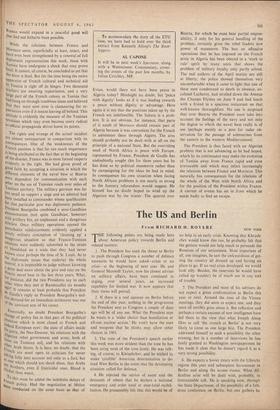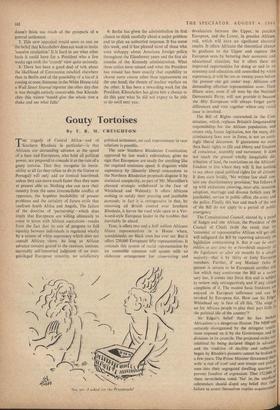The US and Berlin
From RICHARD H. ROVERE NEW YORK THE following points are being made here about American policy towards Berlin and related matters: 1. The President has used the threat to Berlin to push through Congress a number of defence measures he would have asked—crisis or no crisis—at the beginning of next year. He and General Maxwell Taylor, now his closest adviser on military affairs, have been consistent in urging, over several years, an increased capability for limited war. It now appears that their views will prevail.
2. If there is a real squeeze on Berlin before the end of this year, nothing in the programme the President sent to Congress a couple of days ago will be of any use. What the President says he wants is a 'wider choicd than humiliation or all-out nuclear action.' He won't have the men and weapons that he thinks may allow other choices in 1961.
3. The tone of the President's speech earlier this week was more strident than the tone he has been using most of the time lately. He was talk- ing, of course, to Khrushchev, and he wished to make 'credible' American 'determination to de- fend West Berlin in the event that the developing situation called for defence.
4. He rejected the advice of some and the demands of others that he declare a national emergency and order total or near-total mobil- isation. He presumably felt that this would be of no help in an early crisis. Knowing that Khrush- chev would know this too, he probably felt that the gesture would not help much to persuade the Russians .of our seriousness. Most important of all, one imagines, he saw the awkwardness of get- ting the country all dressed up and having no place to go. If no real crisis developed, we would look silly. Besides, the reservists he would have called up wouldn't be of much use in any sort of trouble.
5. The President and most of his advisers do not expect a great confrontation at Berlin this year or next. Around the time of the Vienna meetings, they did seem to expect one, and they were all terribly grim about it. But reflection and perhaps a certain amount of new intelligence have led them to the view that what Joseph Alsop likes to call 'the crunch at Berlin' is not very likely to come as one large bite. The President addressed himself to such a possibility the other evening, but in a number of interviews he has lately granted to Washington newspapermen he has made it clear that he doesn't regard it as a very strong possibility.
6. He expects a Soviet treaty with the Ulbricht regime this year and subsequent harassment in Berlin and along the access routes. What dif- ficulties arise will be dealt with, probably, in interminable talk. He is speaking now, through the State Department, of the possibility of a full- dress conference on Berlin, but one gathers he doesn't think too much of the prospects of a general settlement. 7. This new appraisal would seem to rest on the belief that Khrushchev does not want to invite `massive retaliation.' It is hard to see what other basis it could have for a President who a few weeks ago took the `crunch' view quite seriously. 8. There has been a good deal of talk about the likelihood of Communist mischief elsewhere than in Berlin and of the possibility of a lot of it coming at once. Someone in the. White House told a Wall Street Journal reporter the other day that it was thought entirely conceivable that Khrush- chev this winter 'would give the whole tree a shake and see what falls.' 9. Berlin has given the administration its first chance to think carefully about a major problem and to plan an unhurried response. It has come this week, and it has pleased most of those who were unhappy about American foreign policy throughout the Eisenhower years and the first six months of the Kennedy administration. What these critics have missed and what the President has missed has been exactly that capability to choose some course other than appeasement on the one hand, the threats of nuclear warfare on the other. It has been a rewarding week for the President. Khrushchev has given him a chance to do this year what he did not expect to be able to do until next year.



































 Previous page
Previous page